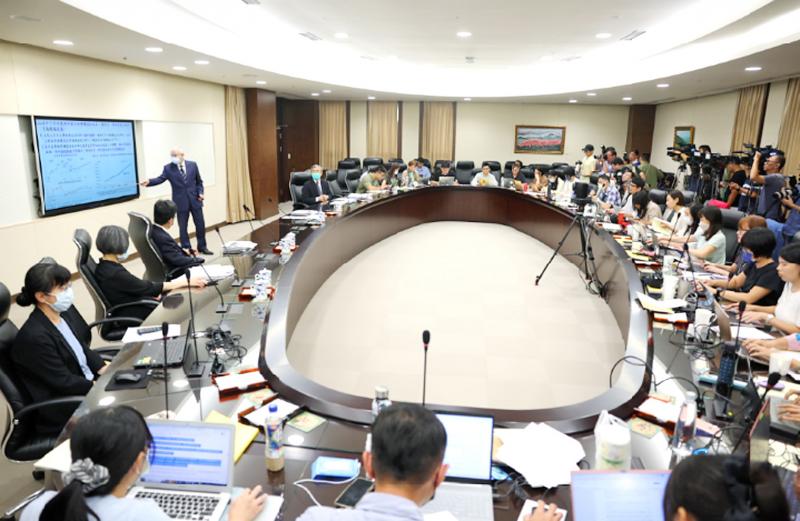The central bank said yesterday that it has upgraded its forecast of Taiwan’s GDP growth for this year to 3.82 percent, with the export-oriented economy expected to benefit from robust global demand for emerging technologies.
The upgrade was announced after the central bank wrapped up its quarterly policymaking meeting, raising this year's GDP growth from the previous estimate of 3.77 percent made in June.
The revised forecast came closer to an estimate by the Directorate-General of Budget, Accounting and Statistics (DGBAS) last month, which forecast GDP would grow 3.9 percent this year.

Photo: CNA
In addition to a strong export performance, the local economy is also boosted by an increase in private investment and private consumption, the central bank said.
However, due to a relatively high comparison base last year, the economy would grow 1.99 percent in the second half of this year after a 5.83 percent increase in the first half, it said.
The central bank also raised its forecast for consumer price index (CPI) growth from 2.12 percent in June to 2.16 percent, while it lowered its forecast for growth in core CPI, which excludes fruit, vegetables and energy to 1.94 percent, below the 2 percent alert set by the bank.
Since June, bad weather has adversely impacted agricultural supplies and pushed up the price of fruit and vegetables so the central bank raised its CPI growth forecast, but core CPI growth will continue its downtrend, with fruit and vegetables excluded, it said.
For next year, the central bank said exports and private investment are expected to continue to grow and with momentum in private consumption on the rise, the economy is expected to grow steadily at 3.08 percent.
In the policymaking meeting, the central bank also decided to leave its key interest rates unchanged for the second consecutive quarter despite a 50 basis point cut by the US Federal Reserve overnight.
After the decision, the discount rate remains at 2 percent which is still the highest in 15 years, with the rate on accommodation with collateral at 2.375 percent, and the rate on accommodations without collateral at 4.250 percent.

Taiwan’s long-term economic competitiveness will hinge not only on national champions like Taiwan Semiconductor Manufacturing Co. (TSMC, 台積電) but also on the widespread adoption of artificial intelligence (AI) and other emerging technologies, a US-based scholar has said. At a lecture in Taipei on Tuesday, Jeffrey Ding, assistant professor of political science at the George Washington University and author of "Technology and the Rise of Great Powers," argued that historical experience shows that general-purpose technologies (GPTs) — such as electricity, computers and now AI — shape long-term economic advantages through their diffusion across the broader economy. "What really matters is not who pioneers

In a high-security Shenzhen laboratory, Chinese scientists have built what Washington has spent years trying to prevent: a prototype of a machine capable of producing the cutting-edge semiconductor chips that power artificial intelligence (AI), smartphones and weapons central to Western military dominance, Reuters has learned. Completed early this year and undergoing testing, the prototype fills nearly an entire factory floor. It was built by a team of former engineers from Dutch semiconductor giant ASML who reverse-engineered the company’s extreme ultraviolet lithography (EUV) machines, according to two people with knowledge of the project. EUV machines sit at the heart of a technological Cold

TAIWAN VALUE CHAIN: Foxtron is to fully own Luxgen following the transaction and it plans to launch a new electric model, the Foxtron Bria, in Taiwan next year Yulon Motor Co (裕隆汽車) yesterday said that its board of directors approved the disposal of its electric vehicle (EV) unit, Luxgen Motor Co (納智捷汽車), to Foxtron Vehicle Technologies Co (鴻華先進) for NT$787.6 million (US$24.98 million). Foxtron, a half-half joint venture between Yulon affiliate Hua-Chuang Automobile Information Technical Center Co (華創車電) and Hon Hai Precision Industry Co (鴻海精密), expects to wrap up the deal in the first quarter of next year. Foxtron would fully own Luxgen following the transaction, including five car distributing companies, outlets and all employees. The deal is subject to the approval of the Fair Trade Commission, Foxtron said. “Foxtron will be

INFLATION CONSIDERATION: The BOJ governor said that it would ‘keep making appropriate decisions’ and would adjust depending on the economy and prices The Bank of Japan (BOJ) yesterday raised its benchmark interest rate to the highest in 30 years and said more increases are in the pipeline if conditions allow, in a sign of growing conviction that it can attain the stable inflation target it has pursued for more than a decade. Bank of Japan Governor Kazuo Ueda’s policy board increased the rate by 0.2 percentage points to 0.75 percent, in a unanimous decision, the bank said in a statement. The central bank cited the rising likelihood of its economic outlook being realized. The rate change was expected by all 50 economists surveyed by Bloomberg. The